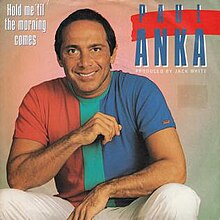
Paul Albert Anka is a Canadian and American singer, songwriter and actor. He is best known for his signature hit songs including "Diana", “You Are My Destiny", “Lonely Boy", "Put Your Head on My Shoulder", and "(You're) Having My Baby".

"My Way" is a song popularized in 1969 by Frank Sinatra set to the music of the French song "Comme d'habitude" composed by Jacques Revaux with lyrics by Gilles Thibaut and Claude François and first performed in 1967 by Claude François.

Juice Newton is an American pop and country singer, songwriter, and musician. Newton has received five Grammy Award nominations in the Pop and Country Best Female Vocalist categories – winning once in 1983 – as well as an ACM Award for Top New Female Artist and two consecutive Billboard Female Album Artist of the Year awards. Newton's other awards include a People's Choice Award for "Best Female Vocalist" and the Australian Music Media's "Number One International Country Artist".
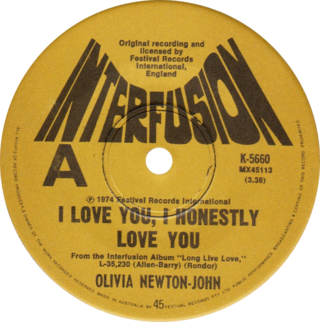
"I Honestly Love You" is a song recorded by Olivia Newton-John and released in 1974 on the album Long Live Love in the United Kingdom and If You Love Me, Let Me Know in the United States. The song became a worldwide pop hit, her first number-one single in the United States and Canada. The single was first released in Australia as "I Love You, I Honestly Love You", as per its chorus. The song was written by Jeff Barry and Australian singer and composer Peter Allen. The latter recorded it around the same time for his album Continental American.
Country pop is a fusion genre of country music and pop music that was developed by members of the country genre out of a desire to reach a larger, mainstream audience. Country pop music blends genres like rock, pop, and country, continuing similar efforts that began in the late 1950s, known originally as the Nashville sound and later on as Countrypolitan. By the mid-1970s, many country artists were transitioning to the pop-country sound, which led to some records charting high on the mainstream top 40 and the Billboard country chart. In turn, many pop and easy listening artists crossed over to country charts during this time. After declining in popularity during the neotraditional movement of the 1980s, country pop had a comeback in the 1990s with a sound that drew more heavily on pop rock and adult contemporary. In the 2010s, country pop metamorphosized again with the addition of hip-hop beats and rap-style phrasing.
The Adult Contemporary chart is published weekly by Billboard magazine and lists the most popular songs on adult contemporary radio stations in the United States. The chart is compiled based on airplay data submitted to Billboard by stations that are members of the Adult Contemporary radio panel. The chart debuted in Billboard magazine on July 17, 1961. Over the years, the chart has undergone a series of name changes, being called Easy Listening(1961–1962; 1965–1979), Middle-Road Singles(1962–1964), Pop-Standard Singles(1964–1965), Hot Adult Contemporary(1984–1996) and Adult Contemporary(1979–1984, 1996–present). The current number-one song on the chart is "Lose Control" by Teddy Swims.

"Snowbird" is a song written by Canadian singer-songwriter Gene MacLellan. Though it has been recorded by many performers, it is best known through Anne Murray's 1969 recording, which—after appearing as an album track in mid-1969—was released as a single in mid-1970.
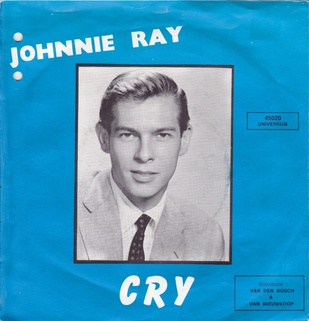
"Cry" is a 1951 popular song written by Churchill Kohlman. The song was first recorded by Ruth Casey on the Cadillac label. The biggest hit version was recorded in New York City by Johnnie Ray and The Four Lads on October 16, 1951. Singer Ronnie Dove also had a big hit with the song in 1966.

"How Am I Supposed to Live Without You" is a song co-written in 1982 by Doug James and Michael Bolton. The track was originally recorded by Laura Branigan in 1983, charting at number one in both the US and Canadian Adult Contemporary charts. Bolton later recorded his own version of the song that topped the US Billboard Hot 100 and became a worldwide hit.
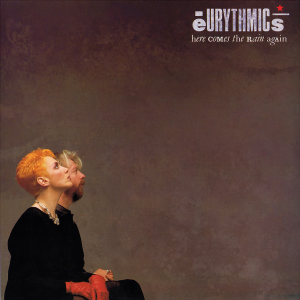
"Here Comes the Rain Again" is a 1983 song by British duo Eurythmics and the opening track from their third studio album Touch. It was written by group members Annie Lennox and David A. Stewart and produced by Stewart. The song was released on 13 January 1984 as the album's third single in the UK and in the United States as the first single.
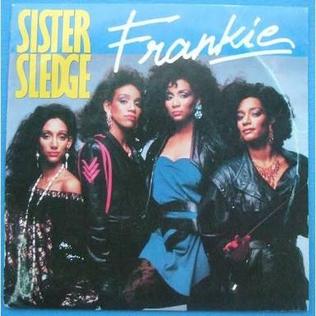
"Frankie" is a song by American vocal group Sister Sledge, released as a single in 1985. It is taken from their eighth studio album, When the Boys Meet the Girls (1985).
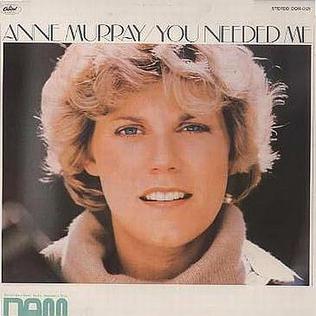
"You Needed Me" is a song written by Randy Goodrum, who describes it as being about "unconditional undeserved love". It was a number-one single in the United States in 1978 for Canadian singer Anne Murray, for which she won a Grammy Award. In 1999, Irish pop band Boyzone recorded a hit cover of the song that reached number one on the UK Singles Chart.

"Turn Your Love Around" is a pop/R&B single by George Benson. The song was written by Grammy winners Bill Champlin of Chicago, Steve Lukather of Toto and producer and guitarist Jay Graydon to help fill out Benson's 1981 greatest hits album, The George Benson Collection. The song won a Best R&B Song Grammy Award at the 25th Grammy Awards in 1983 for Champlin, Graydon, and Lukather as its co-writers.

"It's Still Rock and Roll to Me" is a song written and performed by Billy Joel, from the hit album Glass Houses. Released in 1980, the song peaked at number 1 on the Billboard Hot 100 for two weeks, from July 19 through August 1, 1980, making it Joel's first number 1 hit single in the United States. The song spent 11 weeks in the top 10 and was the 7th biggest hit of 1980 according to American Top 40.

"Love Song" is the debut single by American singer-songwriter Sara Bareilles, released in June 2007 via Epic Records from her major-label debut album, Little Voice (2007). It was nominated for 2009 Grammy Awards in the categories Song of the Year and Best Female Pop Vocal Performance.

"Til I Hear It from You" is a song by the Gin Blossoms that was released as the lead single from the soundtrack to the film Empire Records in July 1995. It topped the Canadian RPM Top Singles chart for six weeks, rose to number eight in Iceland, and reached number 39 in the United Kingdom. In January 1996, it was re-released as a double-A side with "Follow You Down" in the United States, peaking at number nine on the Billboard Hot 100. Billboard described "Til I Hear It from You" as "the closest thing to a perfect pop song to hit radio in recent memory" lauding its "breezy and wonderfully infectious melody, the boy-needs-girl lyrics, and the earnest execution."

The Bridge is the debut album of Canadian R&B/soul singer Melanie Fiona, released under the SRC/Universal Motown label in June 2009. It was released in the United States on November 10, 2009. The album debuted at number four on the Billboard Top R&B/Hip-Hop Albums chart and at number 57 on the Billboard 200 chart, where it later peaked at number 27. The album received generally favorable reviews. As of February 2012, the album has sold 450,000 copies in the United States.

"Just Give Me a Reason" is a song recorded by American singer Pink featuring Nate Ruess of the band Fun. The song was chosen as the third single from Pink's sixth studio album, The Truth About Love (2012). Written alongside producer Jeff Bhasker, "Just Give Me a Reason" is a pop ballad about the desire to hold on to a relationship even when it appears to be breaking down.

A Special Part of Me is an album by American pop singer Johnny Mathis that was released on January 22, 1984, by Columbia Records and reunited him with his "Too Much, Too Little, Too Late" partner Deniece Williams on one of the LP's two duets, "Love Won't Let Me Wait", which is also the only song on the album that was previously recorded and released by another artist. This continuing trend away from the cover album genre would reach its limit with his next studio release, Right from the Heart, which only had original material.

Anthology is a compilation album by country pop singer Juice Newton. It was originally released by Renaissance Records on October 13, 1998. The album covers her career from 1975 to 1989 and features 19 songs taken from her albums Juice Newton & Silver Spur, Juice, Quiet Lies, Can't Wait All Night, Old Flame, Emotion, and Ain't Gonna Cry. However, it includes the 1975 take of "The Sweetest Thing " from the first RCA album, not the 1981 hit version from Juice.
